Regenerative agriculture is our focus
Our goal is to help growers of all kinds, from farmers to window-box gardeners, to understand the range of sustainable growing practices possible in our area.
Inspired by the native oak savanna ecosystem that once covered much of the park, our goal for agriculture here is not a fencerow-to-fencerow operation, but an integrated landscape approach emphasizing agroforestry and the principles of permaculture.
We invite you to visit the park to see what we are doing. Education is core to our mission--reach out if you have an idea for an agriculture workshop you would like to attend, or have the expertise to present.
Consider becoming a Grower Partner if you have a plan, but lack land.
What’s up with the gardens at Silverwood?
Individuals lease space from Friends of Silverwood Park to grow fruits, vegetables and flowers for their Community Supported Agriculture (CSA) shares, farmer’s market stands, families, and for donating to Edgerton Community Outreach Food Pantry. Growers practice organic (no chemical pesticide or herbicides) as well as other sustainable and regenerative agriculture practices. In addition, growers participate in educational events held at Silverwood Park, including summer school, Field Days, and Harvest Fest.
Park etiquette near the gardens:
Respect that the gardens exist for small businesses - feel free to walk around and read any signage, but refrain from walking in the gardens without permission
- Sampling or picking of fruits, vegetables, and flowers cuts into a grower’s profits.
- Keep dogs on a leash, so they don’t trample plants. Pick up their poop.
- Take all the pictures you desire, without walking into the gardens.
- Feel free to visit with the growers and ask questions, however, respect that they are working and maybe harvesting for an upcoming market day. Keep the visit short.
- Buildings and sheds are the property of growers and Friends of Silverwood Park – they are off limits, unless part of a designated event.
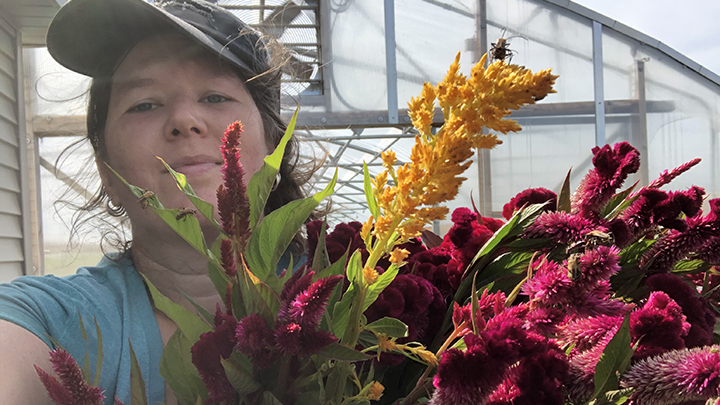
Molly of Yellow Dog Flowers at the farm with a harvest of celosia
In addition to personal and market gardens, what’s growing here?
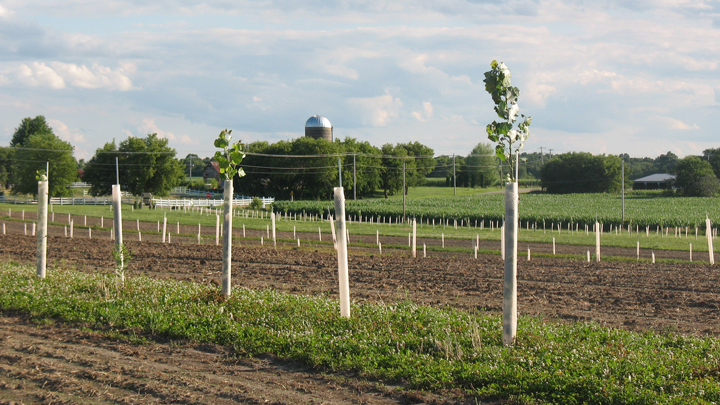
The innovation hub we are creating on Silverwood Park’s more than 200 tillable acres follows the practices of regenerative agriculture. This is a conservation and rehabilitation approach to food and farming systems that focuses on strengthening the health and vitality of the soil. Practices at Silverwood Park include encouraging biodiversity, enhancing ecosystem services, recycling as much farm waste as possible, and strategic use of pollinator plantings.
Soil health is of particular interest at Silverwood Park because conventional farming practices were used until recently. Over time, conventional farming practices drastically reduced the organic matter in the soil of these agricultural fields.
We currently use cover crops and in the future hope to add pasture animals that will accelerate the return of vitality to our soils. Dane County and Friends of Silverwood Park have committed to organic conversion.
For more information about the differences between organic and conventional farming, visit the Rodale Institute's website.
Agroforestry
A joint focus on education, research, and agricultural practice led the Friends of Silverwood Park to join forces with the Savanna Institute, a nonprofit promoting the widespread adoption of agroforestry in the Midwest.
The large-scale plantings of tree and shrub crops at Silverwood Farm consist of interplantings of chestnut and elderberry to demonstrate field-scale fruit and nut production and interplantings of black walnut and hybrid poplar trees to demonstrate field-scale timber and wood pulp production. Windbreaks of hybrid poplar have been planted along the edges of the field where it abuts neighboring crop fields, and elderberry and black currant have been planted in rows to demonstrate large-scale berry production. Tree holes were dug using a hand auger, and all chestnuts, oaks, and hybrid poplars were enclosed in translucent tree tubes.
Demonstration field
The 18-acre alley-cropping demonstration area at Silverwood is a collaborative venture between four partners, integrating government, non-profit, and private interests. Designed and managed in partnership with the Savanna Institute and a local organic row crop farmer Mark Doudlah features alley cropping, a variety of fruit and nut trees and shrubs, and a tasting orchard. This agroforestry demonstration area serves as a hands-on educational center for the park’s K-12 education program, adult workshops and classes, and for all park visitors through interpretive signs positioned around the site. It also provides a training site for beginning agroforestry farmers.
Find an informative press release from Dane County about the launch of this project here.
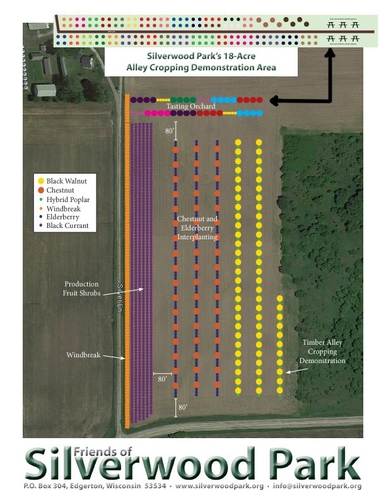
Tasting orchard
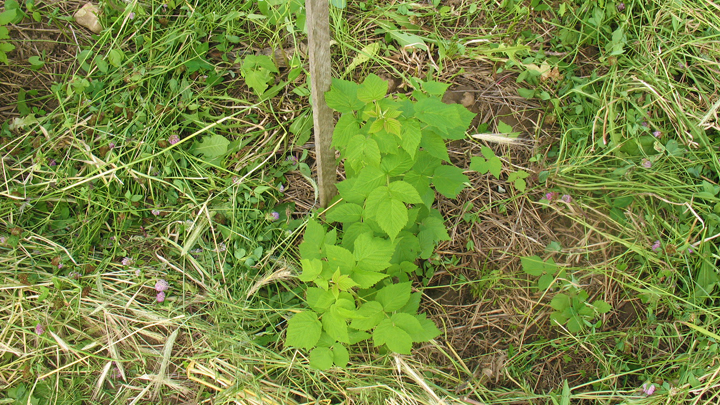
Planted within easy walking distance of the site parking lot, the tasting orchard includes a wide variety of fruit and nut trees and shrubs encased in tree tubes or wire cages. Once mature, this high-diversity orchard will display more than forty species of edible fruit and nut trees and shrubs that can be grown in Wisconsin. These plants will serve as a living library of woody crops, providing an invaluable educational resource for production growers and home gardeners and eventually providing tasting opportunities for park visitors.
Pollinators
In 2016, the Friends of Silverwood Park began a project to establish a pollinator prairie at the park. This prairie is being developed to provide an outdoor classroom for the public to learn about the value of pollinators to agriculture, and about how to help protect and support pollinators. FOSP is seeking donations to support establishment of the prairie, and to provide interpretive education to the public.
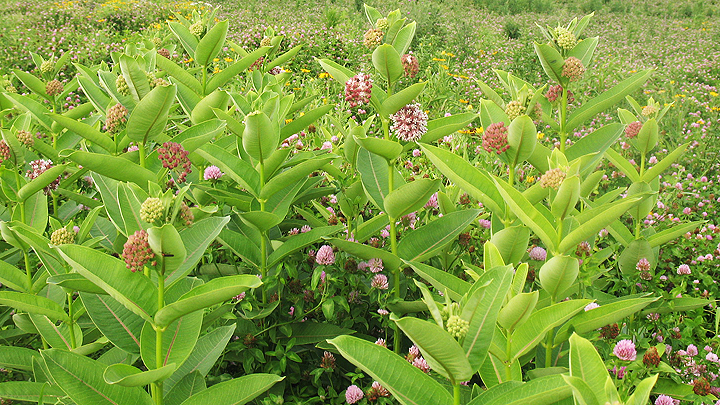
Soil health
Conventional farming practices were used at Silverwood Farm before it was donated to Dane County Parks. Chemically-exhaustive extractive practices were used that drastically reduced the organic matter in the soil of these agricultural fields. We currently use cover crops and are planning to add pasture animals that will accelerate the return of vitality to our soils. Dane County and Friends of Silverwood Park have committed to organic conversion. Healthy soils will increase nutritive value of the plants grown at the park, and reduce the need for synthetic fertilizers and pesticides.
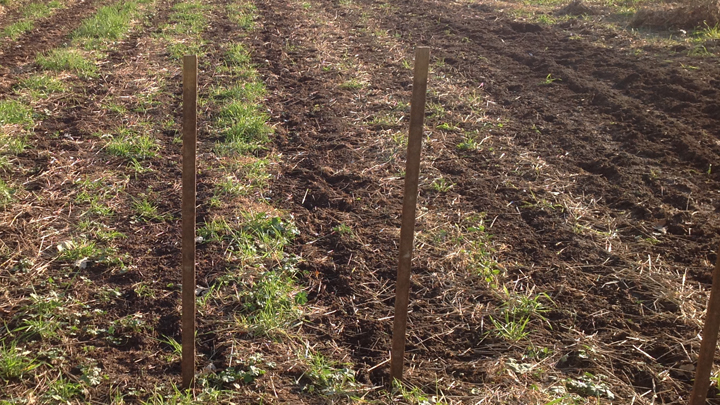
Welcome to Silverwood Park
Park Hours: 5:00 a.m. – 10:00 p.m.
Silverwood News
- Candlelight Hike Jan 25th January 14, 2025
- Candlelight Hike Postponed January 14, 2025
- Candlelight Hike Postponed January 14, 2025
- Grower Profile: LuckySpud July 15, 2024
- Mushroom Inoculation Workshop April 8, 2024

